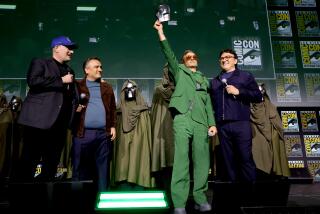Superhero dreams fueled Hollywood’s Iron Man
- Share via
The gig: Chairman of Marvel Studios, the producer of this year’s hits “Iron Man” and “The Incredible Hulk,” and executive vice president of its publicly traded parent company Marvel Entertainment, which controls a library of more than 5,000 comic book characters including Spider-Man and X-Men. Under Maisel’s leadership, Marvel transformed itself from a company that licensed its characters to other studios to a full-fledged studio that produces its own $100-million-plus superhero movies and keeps most of the profits. Over the last two years, Marvel has doubled its stock price, increasing its value to about $2.5 billion.
Background: Grew up in Schenectady, N.Y., where his father was a dentist, his mother a homemaker and he a Marvel comic book fanatic whose favorite character was Iron Man. “I vividly remember pretending I was sick so I could stay home and read comics,” said Maisel, who at 46 still has his childhood collection of more than 400 comic books.
Geek-o-meter: Between his love of comic books and focus on his studies, Maisel readily admits: “I was seriously a geek when I was in high school.”
Education: Studied economics and philosophy at Duke University. He served on the board of trustees and was chairman of the school’s Performing Arts Committee, a role in which he brought a number of Broadway shows to campus, including “Crimes of the Heart” and “Joseph and the Amazing Technicolor Dreamcoat.” Although he was considering a career in law or medicine, he jumped at the chance to go to Harvard Business School when he was accepted in 1985.
The path: After graduating from Harvard Business School in 1987, Maisel was offered a number of jobs, including one to work in strategic planning and corporate development at Walt Disney Co. But when he found out that the starting salary was less than half of what he could make elsewhere, he took a job at Boston Consulting Group. Not only was the salary attractive, Boston Consulting offered Maisel something else he wanted. “They guaranteed me that I could focus 75% of my time on entertainment projects,” said Maisel, whose clients included NBC, NBC Sports, MTV and PBS.
Big break: After seeing a photo of Creative Artists Agency head Michael Ovitz on the cover of Business Week in 1994, Maisel wrote the uber-agent a cold-call letter asking for an interview. He was flown out to Los Angeles and put up at the Beverly Hilton Hotel, where he recalls buying a watch in the lobby to wear at the interview. After he showed up for the interview, he was made to wait all day, only to be told, “It ain’t going to happen, come back tomorrow.” He landed the job working with the agency’s corporate clients, and on his first day Ovitz told him he wanted help on a top-secret project. Ovitz, who four years earlier had helped engineer Japan’s Matsushita Electric Industrial Co.’s acquisition of Universal Studios parent MCA Inc., was now being asked to analyze the performance of the studio and its potential sale. “I couldn’t tell anyone what I was working on,” Maisel said. “It was a very cool experience to be in that world so quickly.”
Following his mentor: After the sale of the studio to Seagram Co. in 1995, Ovitz left CAA to become president of Walt Disney Co., taking Maisel with him. When Ovitz was forced out 14 months later, Maisel accepted his boss’ offer to go with him and help work on new business endeavors. “I learned, from having Michael as my mentor, the street smarts of this town -- and that was invaluable.” In 2001, after stints at the broadband Internet service provider Chello and Toronto-based Livent, Maisel moved back to L.A. and joined talent agency Endeavor, where he worked with the partners on business development. During his second year there, Maisel became a personal investor in Marvel, and in 2003 he made a pitch that would land him his dream job.
The pitch: He sold management on a plan for Marvel to self-finance its movies so it could control its own destiny and retain the upside on its hits rather than let the studios that licensed its characters reap all the rewards. After being hired, Maisel worked the next two years developing Marvel’s new film production strategy and establishing a $525-million non-recourse loan facility to fund the productions. Marvel’s first homegrown production, “Iron Man,” hit pay dirt, grossing about $571 million worldwide, followed by “The Incredible Hulk,” which has so far raked in $261 million in global ticket sales.
Dream job: Maisel can’t imagine having a better gig than he has today in that his job not only taps his business savvy and appreciation for the creative process but marries his passion for comic books and early professional desire to run a movie studio. “The ability to not only make movies but make Marvel movies is a dream. It’s something I pinch myself every day about.”
Life lessons: Losing his father and sister to illnesses within a year of each other in the late 1980s taught Maisel an invaluable lesson and gave him the courage to leave a secure, high-paying job with Boston Consulting and borrow $10,000 from his mom to come to Hollywood. “It made me realize how short life is and how you want to go for your dreams.”
Advice: “Do the preparation and the hard work so when the right opportunities come along, you can take advantage of that.”
--
Got an idea for How I Made It, a feature that appears in Business every Sunday? Send it to howimadeit@latimes.com.
More to Read
The biggest entertainment stories
Get our big stories about Hollywood, film, television, music, arts, culture and more right in your inbox as soon as they publish.
You may occasionally receive promotional content from the Los Angeles Times.










